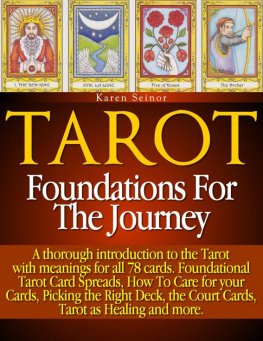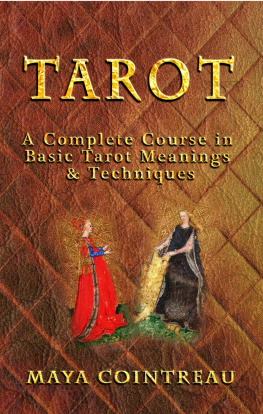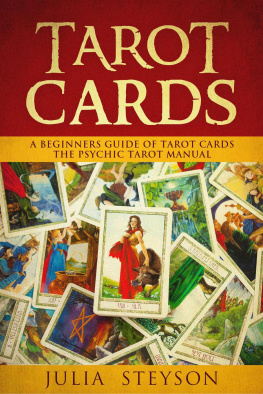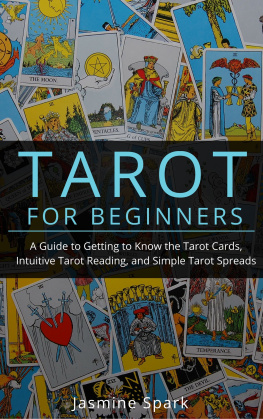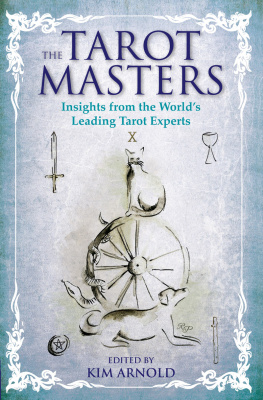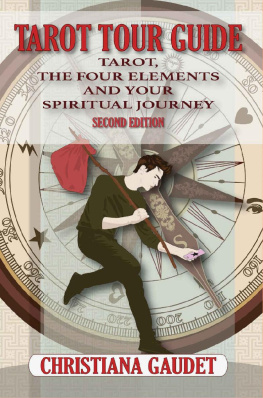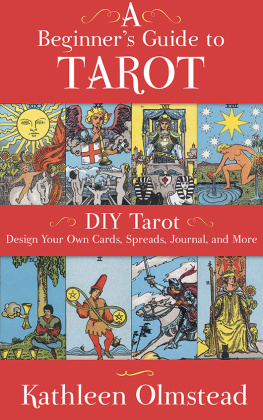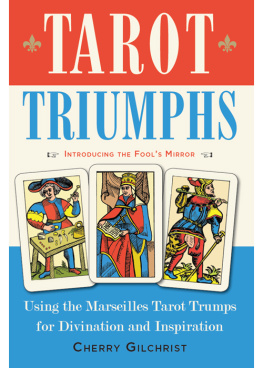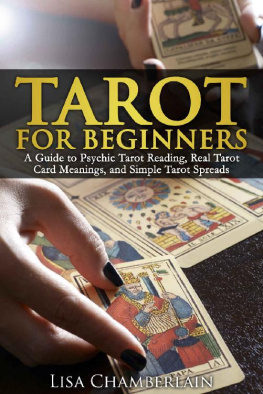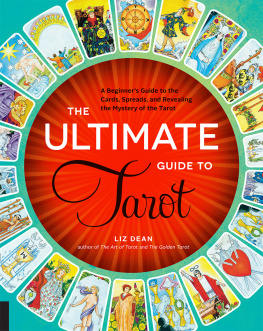The Fools Journey
An adventure on the tree of life
Maureen Clark
M. Clark/ C Somerville
All rights reserved. No part of this work may be reproduced or used in any form or by any means graphic, electronic, or mechanical, including photocopying or information storage and retrieval systems without written permission from the copyright holder
ISBN: 9781082005497
Imprint: Independently published
Preface
The Fools Journey is the posthumous work of my sister, Maureen Clark, BA (Hons); an amazing woman who spent her lifetime writing for the love of it. This work was written (with passion for her subject, dedication and purpose) at the end of the 20 th century but after being rejected by a handful of carefully selected publishers, Maureen moved on to other things. She put this away but thank goodness, didnt throw it away. She was very humble about her work and whenever I brought up the possibility of publishing this book in recent years, she would quietly reply, maybe, and then it would be forgotten again.
When Maureen became very ill, in her 54 th year, she knew she was dying. Dont worry, Carole, she told me, in April, 2018, I still have a few months. She knew, with an intuitive certainty that she would be leaving us in June and on July 2 nd , she gained her angel wings.
Maureen faced death with courage and it was her strength and inner calm that helped keep us strong during her last few months but nothing can prepare you for the loss, the emptiness, the grief.
It was a very personal and private time for our family. Just days before her death, I remembered this book and asked Maureen for permission to publish it. Even though she dismissed it as having been written over thirty years ago and would mean nothing now, she agreed, and asked that I edit and lighten the work as she felt it had been too academic when she had tried to publish it.
We found this book stored with her other works and printed in her own many edited editions. I carefully went through it all to find her final copies. On reading it, I felt that this work is too powerful to be lightened; it is a diligent, informed and well-structured piece of work, and should be preserved as is, and made available for others who care about and love to explore the rich history of the Tarot and are interested in its correspondences with the Kabbalah Tree of Life.
Maureen was a strong woman. She had amazing strength of character. At the age of 14 she was left paralysed from the chest down after an accident while walking with the family. Life had dealt her a cruel blow yet never once did she complain and always she would strive to be positive and focus on her strengths and her interests. She earned her Bachelors Degree at an early age and spent her lifetime researching spiritual and philosophical subjects and writing.
I feel honoured and grateful that Maureen has allowed me to bring this work and indeed, my late sister, out of obscurity and hope you enjoy and appreciate (as I do) the incredible amount of detail that went into the writing of The Fools Journey.
Carole Somerville
Contents
The Fools Journey introduced by Maureen:
The Fools Journey is a book on Tarot, or more specifically, a book of Tarot aligned with the sefirot of the tree of life of Qabalah. (Why I think they should be so aligned, I hope the book explains). Many books have, admittedly, already been published on Tarot. However, apart from a handful (such as Meditations on the Tarot), most seem merely to skim the surface, reducing Tarot to trivialities while ignoring the underlying cohesion and rich spiritual tradition which runs all through Tarot. None, previously, have related Tarot to the sefirot of Qabalah.
In this book, I have sought to rectify this omission by giving both what may be useful in a reading, while attempting also to convey the great power of the mystical heritage which is Tarots very heart. While the book may be of little use to the casual dabbler who merely wishes to impress their friends over coffee, it will, I hope, be of interest to any serious student of Tarot, or to anyone concerned with the mystical paths of life. The Fools journey is the life journey while Tarot provides the guidance to understand the inner realities of this, ultimately spiritual, pilgrimage.
I have studied and (successfully) read Tarot for close to twenty years. My knowledge and interpretation of the cards has thus been tested and hammered out over the crucible of time. I have, over these many years, become intimately acquainted with the depth and richness of this fascinating subject. It is this depth and richness I have tried, in this book, to convey.
th November 1996
Cover Photo: Portae Lucis by Joseph Gikatilla (1248 -1325) Augsburg, 1516 (public domain)
If the fool would persist in his folly he would become wise.
(William Blake)
Introduction
From ancient frescoes decorating temple walls for purposes of divination to games or educational tools in the Renaissance, the origin and antiquity of Tarot has been much debated. As with playing cards themselves, chess, and even, though to a much lesser extent, Qabbalah, a little is known, a lot is presumed and much is speculated.
Chess, we know, was brought to Europe by way of al-Andalus after the first crusade, and it seems probable that cards too, like chess, were brought from the near east by returning crusaders in the two centuries after AD1100. It is speculated too that, again like chess, cards did not originate in the near east but in India, though a form of chess was thought to be played very early in Eastern Asia and Babylon with whom India has long links. The chess of India was not, however, simply the modified Persian-Arabic game as we know it today; rather, it was a symbolic representation of the cosmic conflict between the forces of good and evil. The board itself held mystical significance; the signs of the zodiac, for example, were represented by the twelve inner squares, while the squares around the outer edge represented the twenty-eight houses of the moon. Made of thin wood or ivory, the earliest Indian playing cards were likewise round and small enough to be placed on the squares of a chess board, and it is possible that cards and chess at this early stage may well have been interrelated.
The Indian connection becomes perhaps more tantalizing for Tarot with the ancient Hindustani god/dess Ardhanari, the lord who is male and female. Ardhanari, an image of the unity of Shiva, holds in four hands the four emblems of Tarot: the baton, the cup, the sword and ring. Whereas, although at some point undergoing modification, or as if a slightly different translation of an ancient mystery, the four emblems of Tarot can equally still be recognised in the four treasures of Celtic myth (which influenced the Holy Grail stories): the spear, the stone, the cauldron and the sword. Likewise they can be recognised in the four chief attributes associated with Roman Mercury (and thereby with Greek Hermes): the sickle (sword), the purse showing coins, the baton which became the caduceus and the cup of fortune which became known as the cup of Hermes. Despite the variations in these alternate fours, the similarities are too much to be coincidence. That the four Tarot emblems of the minor suits are somehow tied up with not one but many ancient traditions seems clear. That much of the symbolism of the Tarot majors has a long pedigree reaching into antiquity is likewise very clear. Scenes of the goddess subduing the lion, as in Tarot Strength, for example, can be seen in cylinder seals from as early as 2300 BC. What is not clear is the point at which all the symbols were brought together in the coherent system which we know as Tarot.
As any lengthy study of Tarot symbolism will show, the problem is not the lack of influence and similarities with other cultures and religions, but the wide overlap, as if many strands of influence had suddenly been gathered together. Yet many of the same strands of influence are found in alchemy.
Next page

